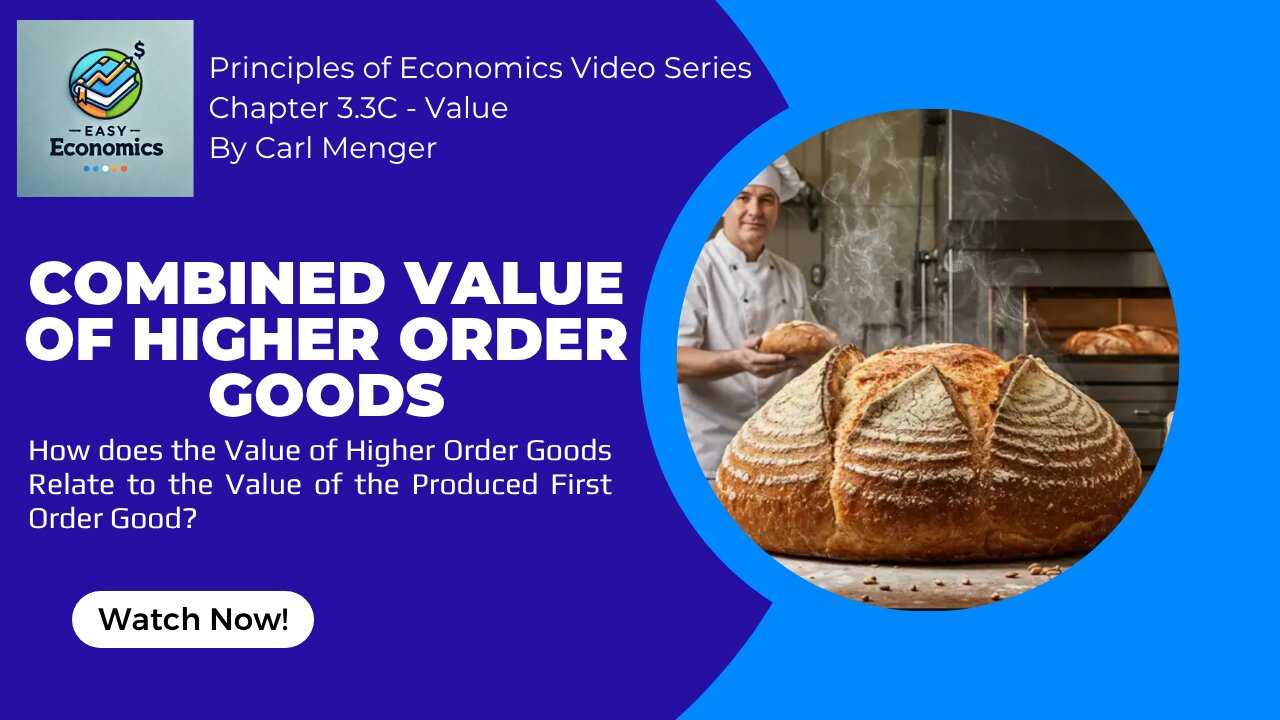Premium Only Content

Principles of Economics by Carl Menger Chapter 3.3C - Combined Value of Higher Order Goods
You want to read the book? Get it here: https://amzn.to/4cCPIQs
Watch the next video in this series: https://rumble.com/v6tm9tb-principles-of-economics-by-carl-menger-chapter-3.3d-the-value-of-individual.html
Watch the video series from the start: https://rumble.com/playlists/I48mBTB4w2c
Watch our video about Carl Menger: https://rumble.com/v61z0l2-carl-menger-the-father-of-austrian-economics-and-subjective-value.html
Why are production inputs worth less than the final product? In this video, we explain Carl Menger’s powerful insight from Principles of Economics, Section 3.3C, about how the value of complementary higher-order goods is determined—and why they’re always valued at a discount compared to the future product they help create.
To turn raw materials, tools, and labor into finished products, you need more than just the right goods—you need time and capital. During the production process, these capital goods are tied up and unavailable for other uses. This time delay carries a cost, and that cost reduces the present value of the inputs.
Menger shows that the value of inputs today is based not only on the expected future value of the final good, but also on the cost of tying up capital and the value of entrepreneurship—the human effort needed to organize and execute production. That’s why no one pays the full price of the future product when buying production goods today—they apply a discount, similar to how a financial instrument loses value over time.
This concept helps explain how markets price production inputs and why entrepreneurial coordination is an economic good with real value.
If you want to understand how real-world production works, why input costs are discounted, and why entrepreneurs matter just as much as labor and materials—this video is for you.
❓ Questions Answered in This Video
-Why are production inputs worth less than the final product?
-What role does time play in valuing higher-order goods?
-How is capital use “priced in” during production?
-Why do buyers discount the value of future goods?
-What is the value of entrepreneurship in production?
-How does time preference affect economic value?
-Why do technical inputs never equal the product’s full value?
-What determines the present value of future goods?
-How is capital “used up” during the production process?
-Why must inputs be controlled for the entire production period?
00:00 - Introduction to the Value of Complementary Quantities of Higher-Order Goods
00:15 - Higher-Order Goods and Time
00:43 - Capital Goods and Value
01:06 - The Cost of Using Capital
01:35 - Example with Grain Production
02:00 - Discounting Future Value
02:35 - Bills of Exchange and Risk
03:02 - The Role of Entrepreneurship
03:38 - Capital, Entrepreneurship, and Value
04:13 - Outro
#CapitalCost #Entrepreneurship #AustrianEconomics
-
 2:05:59
2:05:59
SavageJayGatsby
22 hours agoSpicy Bite Saturday | Let's Play: Supermarket Together
10.5K -
 23:23
23:23
MYLUNCHBREAK CHANNEL PAGE
23 hours agoIstanbul Should Not Exist - Pt 1
43.5K27 -
 1:27:40
1:27:40
Jeff Ahern
6 hours ago $9.88 earnedThe Saturday Show With Jeff Ahern
83.3K34 -
 31:55
31:55
Chris Harden
7 days ago $1.48 earnedChattanooga | Overrated or Underrated?
23K3 -
 11:08
11:08
JohnXSantos
1 day ago $0.50 earnedI Challenged AI to Build a Viral Product From Scratch
20.5K4 -
 0:39
0:39
Danny Rayes
1 day ago $2.29 earnedHis Grandma Thinks He's Innocent!
19.3K18 -
 8:39
8:39
Rethinking the Dollar
10 hours agoSilver Is Rising Fast — But I’m Struggling to Buy More
15.5K7 -
 1:43:14
1:43:14
The Quartering
8 hours agoMassive Charlie Kirk Bombshell! We Knew It!
131K405 -
 2:28:32
2:28:32
MattMorseTV
9 hours ago $38.37 earned🔴Revealing his TRUE MOTIVES.🔴
74.4K227 -
 1:18:02
1:18:02
iCkEdMeL
8 hours ago $21.10 earnedBOMBSHELL: Shooter’s Trans Partner Helped Take Him Down
53K78